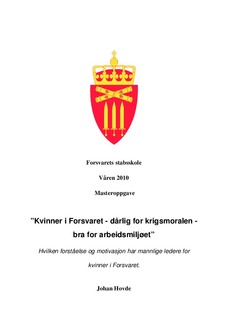"Kvinner i Forsvaret - dårlig for krigsmoralen - bra for arbeidsmiljøet". Hvilken forståelse og motivasjon har mannlige ledere for kvinner i Forsvaret
Abstract
The primary goal with this study is to map out to what extent male leaders accept, understand, and are motivated to work alongside women in the Norwegian armed forces. The study is divided into two separate courses, one where attitudes and general understanding towards women in the Armed Forces is looked at in a historical light, while the other part explores the attitudes amongst male leaders of to day. During the Second World War, Norwegian women living in Great Britain were subject to conscription; however this was abolished immediately after the war ended. In the post war period, there was a polarized debate between political and military leaders, on to what extent women should participate in the armed forces in the future. Previous experiences suggested women were more than suitable to serve in the Armed Forces, but the Government did not want to impose conscription on women. Since the end of the eighties the Armed Forces have been required to increase the number of women in military positions, unfortunately without notable results having been achieved. My hypothesis is directed against the lack of understanding and motivation among male leaders in the Armed Forces of why the military does not achieve a greater gender balance. The majority in this study seem somewhat motivated to include more women in the Armed Forces, although not many seem to grasp how much women can in fact help better the social and professional work environment. This thesis suggests that there is still reason to believe that the Norwegian Armed Forces harbour attitudes towards employing women that can be traced back in time. Interviews provide support for the hypothesis that male leaders lack understanding of why the military would benefit from a higher proportion of women.
